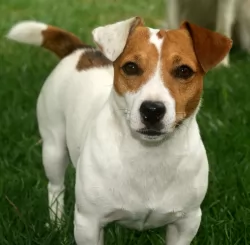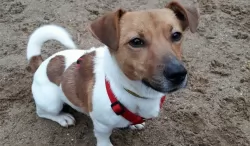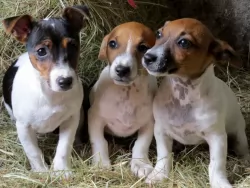 MyDogBreeds
MyDogBreeds Irish Jack Russell is originated from United States but Finnish Spitz is originated from Finland. Irish Jack Russell may grow 15 cm / 5 inches shorter than Finnish Spitz. Irish Jack Russell may weigh 7 kg / 15 pounds lesser than Finnish Spitz. Irish Jack Russell may live 5 years more than Finnish Spitz. Both Irish Jack Russell and Finnish Spitz has almost same litter size. Irish Jack Russell requires Low maintenance. But Finnish Spitz requires Moderate maintenance
Irish Jack Russell is originated from United States but Finnish Spitz is originated from Finland. Irish Jack Russell may grow 15 cm / 5 inches shorter than Finnish Spitz. Irish Jack Russell may weigh 7 kg / 15 pounds lesser than Finnish Spitz. Irish Jack Russell may live 5 years more than Finnish Spitz. Both Irish Jack Russell and Finnish Spitz has almost same litter size. Irish Jack Russell requires Low maintenance. But Finnish Spitz requires Moderate maintenance
 Originating in the United States of America, the Irish Jack Russell, also known as Short Jack Russells, was bred to bring about a calmer temperament and to also have a dog with shorter legs.
Originating in the United States of America, the Irish Jack Russell, also known as Short Jack Russells, was bred to bring about a calmer temperament and to also have a dog with shorter legs.
Always a working dog, breeders of the Irish Jack Russell wanted to create a dog with less of a hunting instinct in him and have a dog which would be more companionable.
These Irish Jack Russells look much like your regular Jack Russell but are more of a companion dog than a hunting dog. The Irish Jack Russell doesn’t adhere to any existing Jack Russell breed standard and isn't really recognized at major dog clubs and kennels. The truth of the whole matter is that there are different kinds of Jack Russells and different names given to them to differentiate between the taller Jack Russell and the short legged one. The shorter Jack Russell Terriers are known by many names such as Irish Jack Russell and Shorty Jack Russells.
 The “barking Bird Dog” or Finnish Spitz was Developed in Finland. The breed is fearless and small with a different style than many other hunting dogs. He style of tracking is unusual and he indicated his quarry by barking. He was bred to hunt all sizes of prey from as large as bears to as small as squirrels. He was called the “Barking Bird Dig” because he pointed at the prey by barking and giving the hunter knowledge of the prey and an easy approach to it. In Finland, the Spitz is still a hunting dog. In 1979 The Finnish Spitz became the national dog of Finland.
The “barking Bird Dog” or Finnish Spitz was Developed in Finland. The breed is fearless and small with a different style than many other hunting dogs. He style of tracking is unusual and he indicated his quarry by barking. He was bred to hunt all sizes of prey from as large as bears to as small as squirrels. He was called the “Barking Bird Dig” because he pointed at the prey by barking and giving the hunter knowledge of the prey and an easy approach to it. In Finland, the Spitz is still a hunting dog. In 1979 The Finnish Spitz became the national dog of Finland.
Spitz-like dogs have been present in Finland for over 8000 years. It is believed that dogs living in higher latitudes had more in common with the Taymyr Wolf od North Asia than with the gray wolf. Tests indicate that the chance of the Spitz being related to the Taymyr is between 1.4&a and 27.3%. The Taymyr is extinct today. This shows that the present day dog descends from more than one type of wolf and more than one area. The Spitz was a favorite of the Finno-Ugrian tribes as he helped them find food. These tribes were pretty isolated until 1880. Then the Spitz were mated with other dogs and were almost extinct as a breed separate from all the other local dogs.
However, like many other breeds the Finnish Spitz found a savior. A Finnish huntsman, named Hugo Roos, noticed the native Finnish Spitz while he was hunting up North. He decided to breed dogs that were genuine Finnish Spitz without the blood of other breeds mixed in. After thirty years the current day Finnish Spitz was born.The latest breed standard was confirmed by the Love Finnish Kennel Club in 1996.
 Irish Jack Russells are small dogs standing at roughly 18 to 35cm and weighing in the region of 5 to 8kg for both males and females.
Irish Jack Russells are small dogs standing at roughly 18 to 35cm and weighing in the region of 5 to 8kg for both males and females.
He looks much like your regular Jack Russell but he has shorter legs, and where the regular Jack Russell has an essentially white coat with orange-tan patches, the Irish Jack Russell can be solid tan or other color variations such as red, brindle, black and tan.
The coat can be short or fairly long and coarse. The Irish Jack Russell is a sturdy, compact dog with a flat skull, brown eyes and ears which are semi-erect, semi-floppy. He has a bright, alert, intelligent look on his face. The tail is set fairly high and has always been docked but these days it is inclined to be left long, taking away from the dog’s nice compact look.
The Irish Jack Russell is perhaps more placid than the regular Jack Russell and that is why he can adapt to life in the city or in the country. They’re intelligent dogs and therefore easy to train and have socialized.
Even though he is a small dog, training and socialization is important as he is a feisty, stubborn, know-it-all little dog. These are dogs which can become possessive of their owner and they can become quite aggressive when protecting their family. He is a highly trainable dog but it is important to have him trained as he tends to be aggressive with other dogs.
He is busy, active, happy and inquisitive and will require regular exercise to prevent him becoming restless and destructive. He has been a working terrier and he always wants to be busy.
 The Finnish Spitz is balanced and symmetrical in body and females are longer than males. They have a very distinguishable prick, foxy ears and face. They have a smiling expression and a curved tail. They are a golden-red color with a double coat. The under coat is dense and soft While the top coat is stiff. Puppies often look like little red fox cubs. When born they are black, grey or brown with a lot of black. As an adult the pups grow up to be a mix of fawn and dark black. Lips, nose and rims of the eyes should be black.
The Finnish Spitz is balanced and symmetrical in body and females are longer than males. They have a very distinguishable prick, foxy ears and face. They have a smiling expression and a curved tail. They are a golden-red color with a double coat. The under coat is dense and soft While the top coat is stiff. Puppies often look like little red fox cubs. When born they are black, grey or brown with a lot of black. As an adult the pups grow up to be a mix of fawn and dark black. Lips, nose and rims of the eyes should be black.
 The Irish Jack Russell is a self-confident, energetic dog who will like nothing more than to be involved with everything you’re doing. The busier he is the better, and because he has strong hunting instincts you may find him digging in your garden for rats.
The Irish Jack Russell is a self-confident, energetic dog who will like nothing more than to be involved with everything you’re doing. The busier he is the better, and because he has strong hunting instincts you may find him digging in your garden for rats.
Have him trained and socialized if you want to avoid certain problems with him and remember to exercise him and provide him with the attention he craves.
He is a social dog and will pine away if you just leave him to get by on his own. Make sure that he becomes every bit as part of your family as everyone else and he promises to make you a loyal, devoted companion.
 Very child friendly – loves to play with children as long as the children pay attention to them. If not, the Spitz will go elsewhere.
Very child friendly – loves to play with children as long as the children pay attention to them. If not, the Spitz will go elsewhere.
They are independent thinkers and close to family but not strangers. They often “yodel” instead of howl.
Needs to be with people, bonds deeply with his humans. Most get along well with other dogs but because of their hunting instinct they are not good with small pets or birds.
They are smart and learn easily. They are great athletes and learn games and competition well.
 Your Irish Jack Russell is a dog that doesn’t battle with too many health issues, but nonetheless you still need to watch out for common health problems.
Your Irish Jack Russell is a dog that doesn’t battle with too many health issues, but nonetheless you still need to watch out for common health problems.
Jack Russell terriers are generally a healthy breed that can live up to 14 years of age, but still every dog is prone to the more common dog problems such as hip dysplasia, bloat, ear infections and dental disease among others.
If your Irish Jack Russell is in pain, he is lethargic and sick, don’t delay – take him to the vet right away.
 Typically, a somewhat healthy breed, the Finnish Spitz does struggle with a few genetic concerns. They have been known to suffer from:
Typically, a somewhat healthy breed, the Finnish Spitz does struggle with a few genetic concerns. They have been known to suffer from:
 The Irish Jack Russell is an average shedder with his short or longish coat which is easy to groom, requiring a brush once or twice a week. His nails grow quickly too and they can get caught on something and cause him damage. Trim your pet’s nails to prevent this.
The Irish Jack Russell is an average shedder with his short or longish coat which is easy to groom, requiring a brush once or twice a week. His nails grow quickly too and they can get caught on something and cause him damage. Trim your pet’s nails to prevent this.
Feed your Irish Jack Russell good quality dog food each day. If you feed him commercially manufactured dog food, be certain to check the feeding instructions on the packaging.
He is a small dog, and overfeeding can be just as bad as under-feeding. It’s never a good idea to just go on and on feeding your pet dry or wet kibble day after day. Add in some cooked chicken, rice, pasta and vegetables as a treat and to also provide some variety for him.
Also a little bit of raw meat occasionally can do him the world of good and you’ll see the appreciation in his bright eyes and wagging tail.
 Don’t overfeed the little guy. The Spitz had a good appetite for a dog its size and can gain weight quickly . Feed twice a day about 1/8th of a cup.
Don’t overfeed the little guy. The Spitz had a good appetite for a dog its size and can gain weight quickly . Feed twice a day about 1/8th of a cup.
The same advice hold for the adult dog. Feed 1/4th of a cub of high quality dry food twice a day.
When the Spitz is a puppy you should limit strenuous exercise and jumping. Don’t spay neuter at too young an age. Wait until they are mature at 3-5 years of age.
Again do not exercise vigorously at too young an age. When older the Finnish Spitz will need a yard to run in and exercise to satisfy his hunting instincts. A long walk every day is a must.